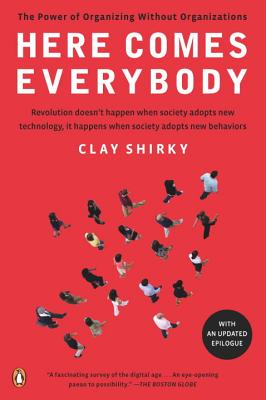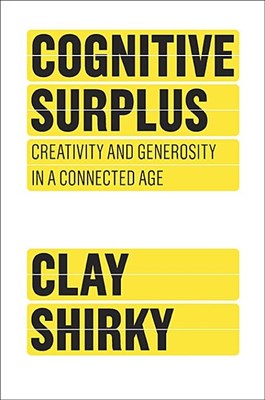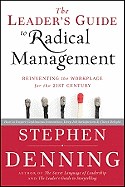Friday Links (On a Snowy Monday Afternoon)
January 10, 2011
It's been a while since we linked up a Friday afternoon, and since I didn't get the chance to do it last Friday, I thought I'd do so today. ➻ Clay Shirky, author of Here Comes Everybody and Cognitive Surplus, contributed an article to the current issue of Foreign Affairs about The Political Power of Social Media. You'll need to purchase the full length article ($0.
Clay Shirky, author of Here Comes Everybody and Cognitive Surplus, contributed an article to the current issue of Foreign Affairs about The Political Power of Social Media. You'll need to purchase the full length article ($0.99) if you're not an active subscriber, or you can read about how Shirky squares the circle (and a little about Evgeny Morozovover's new book, The Net Delusion) over at The Economist. From that review:
For wizened cyberpunks, it is a seemingly timeless debate: does the internet inherently promote openness and democracy, or can it just as easily strengthen the hand of authoritarian regimes? A decade ago Andrew Shapiro's book The Control Revolution argued the former, while Shanthi Kalathil's and Taylor Boas's tome Open Networks, Closed Regimes dissented. This week sees the publication of The Net Delusion: The Dark Side of Internet Freedom by Evgeny Morozov, which sides with the pessimists. [...] Between the cyber-utopians and cyber-pessimists, Mr Shirky has articulated an astute framework and found a sensible middle ground.Head on over to The Economist's review of the argument to read more about Shirky's "three principal contributions to the debate."
Our dear friend and former colleague Daniel Goldin, now the proprieter of Boswell Book Company on Milwaukee's East Side, was featured on NPR's Morning Edition last month with Stusan Stamberg to pick his favorite books of 2010 and answer the question, "Where's the craic?" (You have to actually listen to the story to get the answer to that question, but Daniel is the first bookseller to speak in the story, so you don't have to wait too long.)
2010 might have been the year of the e-reader, but Alexander Chee focused more on I, Reader is his essay at The Morning News in late November. Talking about his first experience in e-book reading—reading 20,000 Leagues Under the Sea on the train with the Kindle app on his phone—and it's effect on him, he writes:
Nicholas Carr's book, The Shallows: What the Internet Is Doing to Our Brains, made a big splash this year, presenting an elegant argument about the way we're being disarrayed. The problems are structural, he argues: This is our brain; this is our brain on the internet. One favorite quote: "Once I was a scuba diver in a sea of words. Now I zip along the surface like a guy on a Jet Ski." Yes, I thought. Me too.
When his book appeared, I'd more or less accepted that this had also somehow happened to me, my brain remapped by the internet. But now with my phone-sized e-reader that sometimes took calls, now that I was walking and reading again the way I did as a child, reading fiction, not news, I noticed during the Gulf oil spill I no longer cared quite as much about the latest shitty thing happening in American politics that was out of my control (and that also made me feel paralyzed by it). Instead, there I was on the train, reading about a giant glowing non-gasoline-burning submarine and wondering why the scientists who borrowed inspiration from science fiction never thought of using that as a tech model. It's not an entirely rose-tinted reflection of e-readers, but Chee's essay is a reminder that, as a reader, no matter how you get them, "There is always going to be a book that saves you."
Steve Denning, author of The Leader's Guide to Storytelling and The Leader's Guide to Radical Management, has written a great, lengthy review of Umair Haque's New Capitalist Manifesto. In it, Denning writes:
Haque believes in firms that have a philosophy, particularly "a philosophy that emphasizes the first, fundamental principle of value creation, rather than planning planning a strategy focused on value extraction." There is thus a shift from an overriding preoccupation with financial value and costs to instilling real values that create the basis for generating thick value that makes a difference in people's lives.The New Capitalist Manifesto was released by Harvard Business School Press last week.
It's a bit old now, but just in case you missed it, The New York Times Sunday Book Review picked 100 Notable Books of 2010. The books on the list that I feel could fit in the business category (some loosely) are:
- All the Devils Are Here: The Hidden History of the Financial Crisis by Bethany McLean & Joe Nocera, Portfolio
- Common as Air: Revolution, Art, and Ownership by Lewis Hyde, Farrar, Straus and Giroux
- The Publisher: Henry Luce and His American Century by Alan Brinkley, Knopf Publishing Group
- Country Driving: A Journey Through China From Farm to Factory by Peter Hessler , Harper
- Four Fish: The Future of the Last Wild Food by Paul Greenberg, The Penguin Press
- Last Call: The Rise and Fall of Prohibition by Daniel Okrent, Scribner Book Company
Bethany McLean, coauthor of All the Devils are Here—the only book in the list above that fits neatly into the business category—wrote an Op-Ed last week asking Who Want a 30-Year Mortgage? It turns out a lot of people do, but banks aren't particularly keen on them. McLean looks at the promises coming from both sides of the aisle in Washington and tries to square them with reality, writing:
Almost certainly, any 30-year product would be offered on a more limited basis and at a higher price than it is today. How much higher, it's hard to say. In the pre-crisis days, Fannie used to argue that its guarantee enabled consumers to pay one quarter to one half of a percentage point less in annual interest on their mortgages; today, [William] Gross, [the co-founder and managing director of the investment firm Pimco], says that mortgages without a government guarantee would cost at least several percentage points more. If his numbers are right, then mortgages—and 30-year mortgages in particular—would be far more expensive, and the pool of American homebuyers would shrink.
This may well be the right long-term answer. After all, other countries manage fine without the widespread availability of 30-year fixed-rate mortgages. But is there an American politician alive who would accept responsibility for depressing the housing market further? I think she's implying that the answer is "no," but that rhetorical question is not the end of her point.
Our next article came to life after Bhob Rainey "was recently asked by a student to submit an op-ed column for the Loyola New Orleans student paper, The Maroon." For such a sanguine-sounding publication, Rainey chose a (seemingly) rather blue topic—boredom. Writing that "A radical boredom could remind us that reality is much more vast and exciting than common sense allows," he sums up his article with a brilliant (and creative?) quote from Kenneth Goldsmith:
Creativity is such a bankrupt concept in our culture... such an over used clich, and yet something held so highly esteemed, still, that in order to truly be creative and truly find a way out of that we need to employ a strategy of opposites—we need to be uncreative, we need to be boring, we need to be everything that the culture claims creativity isn't.How boring.
"Try to ride on waves of activity... in every direction" —Junip (Jose Gonzalez/Elias Araya/Tobias Winterkorn)




